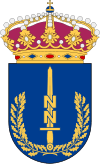Milo NN
| Nedre Norrlands militärområde (Milo NN) | |
|---|---|
 | |
| Active | 1942–1993 |
| Country |
|
| Allegiance | Swedish Armed Forces |
| Type | Military area |
| Role | Multi (Sea, Air and Land) |
| Part of | Swedish Armed Forces |
| Garrison/HQ | Östersund |
Milo NN (Swedish: Nedre Norrlands militärområde, Lower Norrland Military Area) was a Swedish military area, a command of the Swedish Armed Forces that had operational control over Lower Norrland, for most time of its existence corresponding to the area covered by the counties of Västernorrland, Jämtland and the northern part of Gävleborg. The headquarters of Milo NN were located in Östersund.
History
Milo NN was created in 1966 along with five other military areas as part of a reorganisation of the administrative divisions of the Swedish Armed Forces. It can be seen as the successor of II. militärområdet (II. Military Area) created in 1942, but that did not have the same tasks as Milo NN. The military area consisted of the land covered by the above-mentioned counties, and from 1982, also the southern part of Gävleborg County. In 1993, the number of military areas of Sweden was decreased to three, and as a consequence of that, Milo NN was merged with Milo ÖN to create a new military area, Milo N.
Units 1989
In peacetime the Lower Norrland Military Area consisted of the following units, which were training recruits for wartime units:
- Lower Norrland Military Area (Milo NN), in Östersund
- Army units:
- I 5/Fo 22 - Jämtland Jäger Regiment / Jämtland Defense Area, in Östersund
- I 14/Fo 21 - Hälsingland Regiment / Gävleborg Defense Area, in Gävle
- I 21/Fo 23 - Västernorrland Regiment / Västernorrland Defense Area, in Sollefteå
- A 4 - Norrland Artillery Regiment, in Östersund
- T 3 - Norrland Logistic Regiment, in Sollefteå
- Air Force units:
- F 4/Se NN - Jämtland Wing / Air Defense Sector Lower Norrland, in Östersund
- 41st Fighter Squadron, with JA 37 Viggen fighter aircraft
- 42nd Fighter Squadron, with JA 37 Viggen fighter aircraft
- F 15 - Hälsinge Wing, in Söderhamn under operational command of E 1 - 1st Attack Group of Milo V
- 151st Attack Squadron, with AJ 37 Viggen attack aircraft
- 152nd Attack Squadron, with AJ 37 Viggen attack aircraft and SK 37 two-seat trainer aircraft
- F 4/Se NN - Jämtland Wing / Air Defense Sector Lower Norrland, in Östersund
- Navy units:
- MKN - Norrland Coast Naval Command, in Härnösand
- KA 5 - Härnösand Coastal Artillery Regiment, in Härnösand
- Fortress Battalion Hemsön covering the Hemsön Naval Base near Härnösand, with three twin 152mm m/51 coastal artillery guns, and two 75mm Tornpjäs m/57 batteries on Hemsön and Härnön islands
- Fortress Battalion Holmsund covering Umeå, with one 120mm Tornautomatpjäs m/70 battery on Holmögadd and one 75mm Tornpjäs m/57 battery on Bredskär
- Fortress Battalion Gävle, with a battery of four 152mm m/98 turreted cannons and two batteries of three 75mm m/05-10 coastal canons each
- Fortress Battalion Sundsvall, with a battery of three 152mm m/98 turreted cannons, two batteries of three 75mm m/05-10 coastal canons each, and one 75mm Tornpjäs m/57 battery in Nyhamn
- Fortress Battalion Luleå, with a battery of three 152mm m/98 turreted cannons and a battery of three of 57mm m/89 rapid fire guns
- HSwMS Alnösund (14) minelayer
- KA 5 - Härnösand Coastal Artillery Regiment, in Härnösand
- MKN - Norrland Coast Naval Command, in Härnösand
- Army units:
In wartime the Lower Norrland Military Area would have activated the following major land units, as well as a host of smaller units:
- 12th Division, in Östersund
- IB 14 - Gästrikeleden Brigade, in Gävle, a Type 77 infantry brigade based on the I 14 - Hälsingland Regiment
- IB 21 - Ådal Brigade, in Sollefteå, a Type 66M infantry brigade based on the I 21 - Västernorrland Regiment
- NB 35 - Field Jäger Brigade, in Östersund, a Type 85 Norrland Brigade (optimized for arctic/winter warfare) based on the I 5 - Jämtland Jäger Regiment
- IB 44 - Hälsinge Brigade, in Gävle, a Type 66M infantry brigade based on the I 14 - Hälsingland Regiment
- NB 51 - Ångermanland Brigade, in Sollefteå, a Type 85 Norrland Brigade based on the I 21 - Västernorrland Regiment
Commanders
- 1942-1942: Helge Jung
- 1943-1951: Henry Tottie
- 1951-1960: Harald Haegermark
- 1960-1966: Malcolm Murray
- 1966-1973: Tage Ohlin
- 1973-1978: Per Rudberg
- 1978-1982: Gustaf Peyron
- 1982-1987: Rolf Wigur
- 1987-1993: Bengt Lönnbom
See also
References
- Holmberg, Björn (1993). Arméns regementen, skolor och staber: en sammanställning. Arvidsjaur: Svenskt militärhistoriskt bibliotek. ISBN 91-972209-0-6.
- Kjelldorff, Lennart (2001). "Försvarets utveckling från Gustav Wasa till vår tid" (PDF). Försvarets Historiska Telesamlingar. Retrieved 2007-01-12.